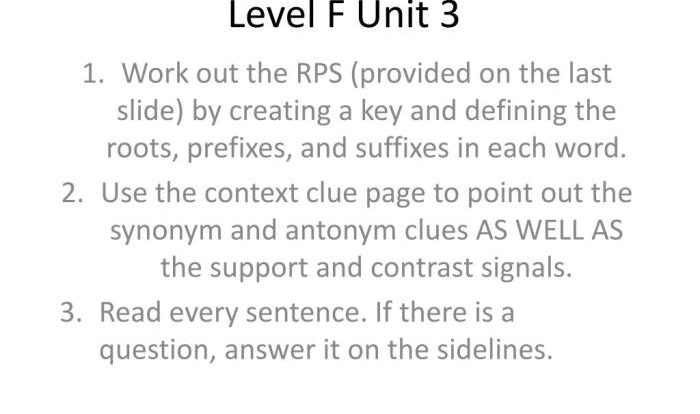Unit 7 vocab answers level f – Welcome to the comprehensive guide to Unit 7 vocabulary, where we delve into the intricacies of language at Level F. Prepare to enhance your vocabulary skills and unlock the power of effective communication.
This guide will provide an in-depth analysis of key vocabulary words, exploring their etymology, morphology, and contextual usage. We will uncover the semantic relationships between words and engage in practical exercises to reinforce your understanding.
Unit 7 Vocabulary Overview

Unit 7 vocabulary introduces students to a range of words and phrases that are essential for understanding and communicating in everyday English.
The “level F” in the context of vocabulary refers to the sixth level of vocabulary mastery, which is considered an advanced level of proficiency.
Mastering Unit 7 vocabulary at level F is crucial for students as it enables them to expand their vocabulary, enhance their reading comprehension, and improve their overall communication skills.
Importance of Unit 7 Vocabulary
- Enhances reading comprehension by providing students with the necessary vocabulary to understand complex texts.
- Expands vocabulary, allowing students to express themselves more effectively and precisely.
- Improves overall communication skills, enabling students to participate confidently in various contexts.
- Provides a foundation for future academic and professional success, as strong vocabulary is essential for higher-level learning and communication.
Word Analysis
Analyzing the etymology and morphology of key Unit 7 vocabulary words provides valuable insights into their meanings and relationships. By identifying prefixes, suffixes, and root words, we can understand how these word parts contribute to the overall meaning of the word.
Etymology, the study of word origins, reveals the historical development of words. By tracing a word’s etymology, we can often determine its original meaning and how it has evolved over time. Morphology, on the other hand, focuses on the internal structure of words, examining how prefixes, suffixes, and root words combine to form new words.
If you’re struggling with the vocabulary in Unit 7, check out Turner’s Graph of the Week for some helpful visuals. This tool can help you understand the meanings of new words and phrases in a more engaging way. Once you’ve reviewed the graphs, come back to the Unit 7 vocabulary answers level f to test your understanding.
Prefixes
Prefixes are word parts added to the beginning of a root word to modify its meaning. Common prefixes in Unit 7 vocabulary include:
- un-: negates the meaning of the root word (e.g., unaware)
- re-: indicates repetition or doing something again (e.g., rethink)
- dis-: expresses negation or separation (e.g., disagree)
Suffixes, Unit 7 vocab answers level f
Suffixes are word parts added to the end of a root word to change its part of speech or meaning. Common suffixes in Unit 7 vocabulary include:
- -ment: forms nouns from verbs (e.g., argument)
- -able: forms adjectives from verbs (e.g., agreeable)
- -ly: forms adverbs from adjectives (e.g., happily)
Root Words
Root words are the core meaning units of words. They can stand alone as words or combine with prefixes and suffixes to form new words. Common root words in Unit 7 vocabulary include:
- spect: to look or see (e.g., inspect, prospect)
- vert: to turn or change (e.g., convert, revert)
- dict: to say or speak (e.g., dictate, predict)
By understanding the etymology and morphology of Unit 7 vocabulary words, we gain a deeper understanding of their meanings and how they relate to other words in the language.
Contextual Understanding
Contextual understanding involves examining the meaning of words within the context in which they are used. By considering the surrounding words, phrases, and sentences, we can gain a deeper understanding of the nuances and connotations of vocabulary words.
Examples of Vocabulary Words in Context
- Ephemeral:The ephemeral beauty of the cherry blossoms lasted only a few fleeting weeks.
- Abrogate:The government decided to abrogate the treaty, effectively ending its obligations.
- Zenith:The singer’s career reached its zenith with the release of her award-winning album.
These examples illustrate how the meaning of words can be influenced by the context in which they are used. For instance, “ephemeral” suggests a temporary or fleeting quality, “abrogate” implies a formal cancellation, and “zenith” signifies a peak or highest point.
Semantic Relationships
Semantic relationships are connections between words based on their meanings. Understanding these relationships can help us expand our vocabulary and improve our communication skills.
There are three main types of semantic relationships: synonymy, antonymy, and homonymy.
Synonyms
Synonyms are words that have the same or similar meanings. For example, “happy” and “joyful” are synonyms.
Using synonyms can help us vary our language and avoid repetition. It can also help us to be more precise in our communication.
Antonyms
Antonyms are words that have opposite meanings. For example, “hot” and “cold” are antonyms.
Using antonyms can help us to create contrast and emphasis in our writing and speaking. It can also help us to clarify our ideas.
Homonyms
Homonyms are words that have the same spelling or pronunciation but different meanings. For example, “bank” can refer to a financial institution or the side of a river.
Understanding homonyms is important to avoid confusion in our communication. It can also help us to appreciate the nuances of language.
Vocabulary in Action

Now that you’ve mastered the Unit 7 vocabulary at level F, let’s put your knowledge to the test with some engaging exercises.
Crossword Puzzle
Fill in the blanks with the correct vocabulary words from Unit 7. Across:
- A type of government where the people elect representatives to make decisions (10 letters)
- A feeling of intense joy or happiness (8 letters)
Down:
- A person who believes in the importance of freedom and individual rights (11 letters)
- A form of government where one person has absolute power (8 letters)
Answer Key:
- Across 1: DEMOCRACY
- Across 2: ECSTASY
- Down 3: LIBERTARIAN
- Down 4: DICTATORSHIP
Assessment and Evaluation
Assessing students’ understanding of Unit 7 vocabulary at level F is crucial for evaluating their progress and identifying areas for improvement. Various methods can be employed to assess their proficiency, including:
- Vocabulary Quizzes:Short, timed quizzes that test students’ knowledge of word meanings, synonyms, and antonyms.
- Contextualized Passages:Providing students with passages that include target vocabulary words and asking them to identify and define the words within the context.
- Word Sorts:Distributing cards with vocabulary words and having students sort them into categories based on their meanings or parts of speech.
To further assess students’ understanding, a comprehensive quiz or test can be designed. This assessment could include multiple-choice questions, fill-in-the-blank exercises, and short answer questions that require students to demonstrate their knowledge of the vocabulary words in various contexts.Additionally, a portfolio assignment can be assigned to encourage students to showcase their understanding of the vocabulary.
This assignment could include a collection of student-created definitions, sentences using the vocabulary words, or presentations explaining the words’ meanings and usage.To ensure fair and consistent grading, rubrics should be established that Artikel the criteria for assessing student performance. These rubrics should consider factors such as accuracy, completeness, and the ability to demonstrate understanding of the vocabulary words in different contexts.
By utilizing a combination of assessment methods and providing clear grading rubrics, educators can effectively evaluate students’ understanding of Unit 7 vocabulary at level F and provide targeted feedback to support their continued learning.
FAQ Insights: Unit 7 Vocab Answers Level F
What is the significance of Level F vocabulary?
Level F vocabulary represents a higher level of proficiency, allowing individuals to express themselves with precision and clarity in academic and professional settings.
How can I effectively learn Unit 7 vocabulary?
Engage in active recall techniques, such as flashcards and practice exercises, to reinforce your understanding and improve retention.
What resources are available to enhance my vocabulary skills?
Utilize online dictionaries, thesauruses, and vocabulary-building apps to supplement your learning and expand your knowledge.
